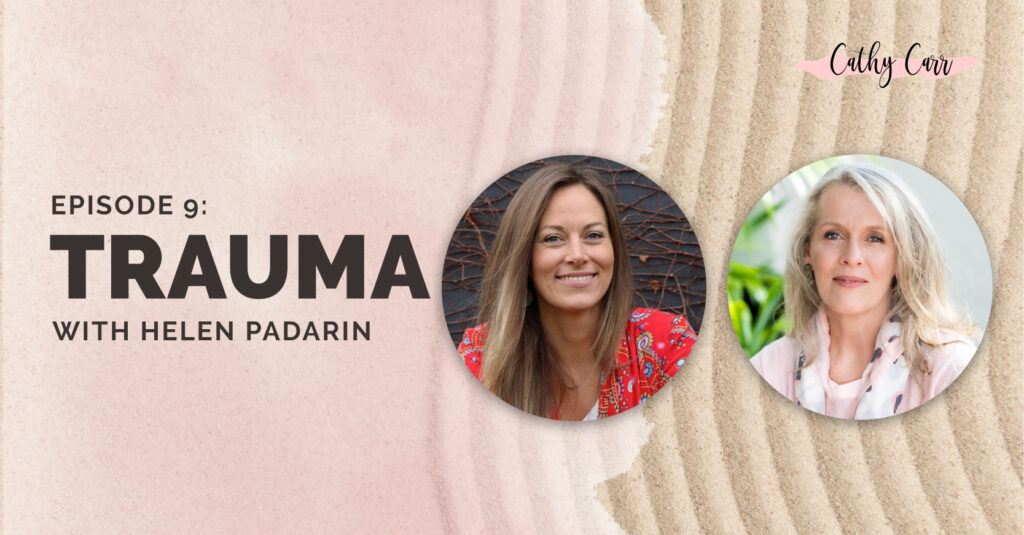As we grow older, various experiences open our hearts and minds to all the flavours that life has to offer. Sometimes we don’t even realize that our bodies are filled with trauma because we’re so used to having protective thoughts and actions.
Our guest in the Rejuvenated Woman Podcast, Helen Padarin gave a value-filled discussion about trauma and healing. Helen is a naturopath, nutritionist, medical herbalist, author, and she’s been in clinical practice for 21 years.
Helen has been on a journey of healing herself from all the trauma that she encountered. She stated that “we only know what’s normal for us and what we’ve experienced becomes our template of how we see the rest of the world.” If we were confronted with traumatic events that we never healed from, it influences how we deal with life.
Although there are numerous types of trauma, Helen mentioned shock, developmental/emotional, collective trauma, and birth trauma in the podcast. These are the trauma areas where she has clinical expertise.
Shock Trauma is a very obvious type of trauma. It can be trauma from violence, crime, accidents, rape, or natural disasters. We tend to fully grasp these events as something that naturally leads to traumatic feelings.
While Developmental Trauma happens subtly; we don’t recognize the impact instantly. This kind of trauma predominantly occurs in the first few years of life. It’s natural for us to be very dependent on our caregivers for several years before we become independent.
As a result of being too dependent, we shape our behaviours in a way that will keep our caregivers looking after us. We start developing protective behaviours that whenever we perceive threat to our safety we either adapt or shut down ourselves.
Developmental trauma is carried until we reach adulthood and manifested in how we express ourselves. Helen stated that we often think that we’re obliged to look after other people’s needs before our own. She added, “I sabotage myself to make sure that someone else is okay, and in doing so, I make myself sick, I put others’ needs first.”
But we have to realize that for us to take care of others to an effective degree, we need to be aware of how we take care of ourselves. When we’re conscious of our wounds, we become more responsible to move towards healing.
Helen also discussed Thomas Hübl’s Collective Trauma framework. She mentioned that the way to heal collective trauma is for us to heal individually first. The best example for this type of trauma is the global pandemic we’re all experiencing.
In an article written by Psychology Today, collective trauma is defined as “the impact of a traumatic experience that affects and involves entire groups of people, communities, or societies.” This kind of trauma affects how we interact with other people. When individuals focus on healing themselves first, this changes their energy and behaviour towards other people.
Birth Trauma is the distress experienced by mothers during or after giving birth. Most traumas are felt physically but birth trauma impacts the emotional and psychological well-being of mothers. People may think that giving birth is a normal process a woman goes through thus giving birth is not seen as a potentially traumatic event. In these circumstances, women may think that there’s no one to turn to for support.
How to heal from trauma?
We go through different types of trauma and healing begins with the acceptance that we’ve been wounded, yet we’re capable of healing. It may not always seem easy since our minds take a longer time to heal, it will keep repeating records of traumatic events that affect our bodies.
Helen states that “it’s super easy to get critical, judgy or shameful about having a certain behaviour or trauma.” However, we need to realize that the best way to initiate healing is to approach ourselves with a lot of compassion and with a big, open heart. Apart from compassion, somatic therapy and asking for help from experts is also significant.
- Start with compassion
One of the things that trauma does is that it takes us out of our bodies. We become dissociated from the body, and we’re just in our heads. When our minds are in control, it constantly plays a record with similar dynamics of how trauma was developed even though the event happened long ago.
When we consistently replay a traumatic event, it sabotages our actions and how we live. The best way to approach this is with a lot of compassion and be grateful that our minds want us to feel secure and safe. Rather than being harsh about these replays, the best thing to do is to acknowledge and this helps transmute the trauma.
- Somatic therapy or Bottom-up approach
Our bodies are great storytellers, they’re able to hold so much information and intelligence with what it has gone through. When our minds bombard us with traumatic replays, the body may feel distressed and hardened. If this happens, Helen’s advice is to sense the body.
This is called the bottom-up approach or Somatic therapy wherein the body is in charge of making things right. This is done by feeling the surface of the body, feeling what’s under your skin and where your bones are. With this little practice, your heart rate slows down, and you feel calmer.
- Healing from birth trauma
One factor that adds to birth trauma is the fact that we have a very patriarchal medical system and the medicalization of birth. Women need to have real matriarchal guidance before, during, and after childbirth.
Furthermore, healing from birth trauma starts with being compassionate with the self and giving it time to recover. Having a strong support system also helps with letting go of all pent-up emotions.
We may or may not experience traumatic events, but one thing is certain, it can have destructive impacts on our daily lives. When our bodies and minds are placed under intense trauma, it begins to form protective mechanisms that affect how we treat ourselves and others. Dealing with trauma is already stressful and challenging, the best route towards healing is to be more gentle and understanding of our experiences.
Watch the full episode of Rejuvenated Women Ep 9 with Helen Padarin here.
Listen to the full episode of Rejuvenated Women Ep 9 with Helen Padarin here.



